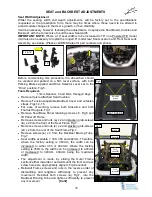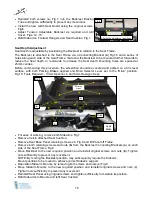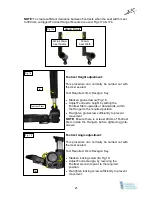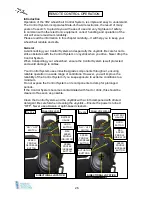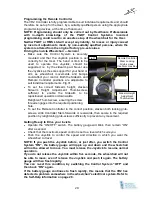
14
Transportation of the Occupant, in a suitably adapted motor vehicle, when seated in
their wheelchair. Models IPC-S and IPC-T
Both Invicta models, IPC-S (Tested as
P17R) and IPC-T (Tested as P17RT) have
been successfully tested, in the forward
facing mode, to ISO 7176 part 19, on the
1st September 2010, at the Transport
Research Laboratory, Berkshire, UK.
The tests were carried out using fixed 4-
point wheelchair restraint systems and
fixed 3-point occupant restraint systems,
tested to ISO 10542 and supplied by
Q-Straint.
The front and rear wheelchair restraint tie-
down points, are clearly marked on the
chassis by standard Karabiner signs and
these are the only positions to be used in
transportation.
Under No circumstances
should the wheelchair Lap or Pelvic Belt be used as the sole
method of occupant restraint.
The safe occupant weight limit for
transportation in the Invicta is 50Kg.
Although the Invicta Wheelchair “Crash
Tests” were carried out without using
Headrests, the use of these devices should
be optional, with the decision as to whether
it is necessary, being made by a suitably
qualified person following an individual risk
assessment.
The Wheelchair with Occupant should be positioned forward facing, centrally, over the tie-
down tracks located on the transporting vehicle floor. Both Parking Brakes should be applied
and the Drive Selector Lever set to the “Drive” (forward position), as indicated in Fig.5
The WTORS (wheelchair tie-down and occupant restraint system) should be connected and
used in accordance with the manufacturers recommendations, see Fig.4 as an example.
TRANSPORTING THE INVICTA WHEELCHAIR
Tie-down Points
Apprx.45°
Apprx.35°
Fig.4
Fig.5
Drive
Apply
Brake
Summary of Contents for IPC-S
Page 1: ...Powered Wheelchairs Instructions for Use Models IPC S and IPC T Edition Two Feb 2013...
Page 2: ...2...
Page 41: ...41 USER NOTES...
Page 42: ...USER NOTES...
Page 43: ...USER NOTES...















